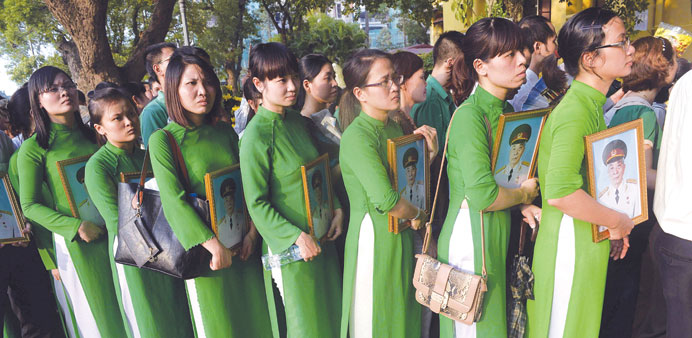AFP
Hanoi
Vietnam is preparing to honour its last great communist icon with a lavish state funeral after a week of remarkable public mourning that has seen tens of thousands queue to pay their last respects.
From octogenarian war veterans to crocodiles of school children, Vietnamese have formed huge lines outside the Hanoi home of General Vo Nguyen Giap, who died aged 102 a week ago.
Two days of official mourning for Giap, who was second only to revered founding president Ho Chi Minh in the affections of the communist nation, started midday yesterday, when all flags were lowered to half mast.
The commemorations come as the heavily-censored one-party state tries to seize Giap’s legacy as a symbol of its own legitimacy, promoting his image as a communist hero while downplaying the general’s later activities as a persistent government critic.
He will lie in state in Hanoi today, before being buried tomorrow in his native Quang Binh province, central Vietnam, in a state funeral attended by the country’s top political figures.
Concerts have been cancelled, national parks closed, and normal state television broadcasts suspended in favour of patriotic music and documentaries for the national mourning period.
Presenters on state television have been wearing sombre-coloured suits and the national under-19 football team wore black armbands to an international tournament this week.
“He was old. We all knew this day would come. But I still feel so sad,” 18-year-old architecture student Bui Cong Giap - no relation - said, adding he had taken the day off and queued for three hours to pay his final respects to the independence hero.
Since his death, officials estimate more than 100,000 people have queued for hours outside Giap’s French colonial villa in downtown Hanoi, waiting to leave flowers and incense at his family altar.
In the authoritarian country, where public demonstrations are routinely broken up by police and anniversary events are heavily stage-managed, the emotional scenes defy expectations.
“We thought people would turn up but we could never have imagined there would be this many,” lieutenant colonel Le Van Hai, who is part of Giap’s funeral organising team, told state media.
“Even when visiting hours are over, people still don’t want to leave.”
On Thursday, the last day Giap’s family home was open to the public, the queue stretched around the block for over a mile as tens of thousands of people patiently waited their turn.
“My whole family admire General Giap,” said tearful Phan Thi Oanh, a 47-year-old saleswoman who had queued for hours with her three and six-year-old grandchildren.
Giap, a former history teacher turned military commander, led his troops to victory over France in 1954 at Dien Bien Phu -- the battle that ended French involvement in Indochina -- and played a key role in Vietnam’s defeat of the US in 1975.
Despite being politically sidelined after the country’s reunification in 1975, Giap remained enormously popular - even with people born after the war.
“The younger generation see him not just as a military hero but a symbol of everything that is right about the Vietnamese nation,” historian Phan Huy Le told state media.
“They found in him a figure they could trust.”
Giap is loved in Vietnam not only as a military genius but also as an outspoken patriot who criticised the regime until well into his 90s.
By writing open letters and using anniversary events to rail against sensitive issues such as corruption and bauxite mining, the general provided implicit cover for party critics and the country’s dissidents, experts said - despite always remaining a loyal party member.
“He belonged to a generation of real communists who sacrificed their lives for the nation and asked for nothing in return,” 69-year-old war veteran and former state official Tran Quang Huy said.
“No other leader will ever earn this much love from the people.”
The death of the general has sparked widespread reaction on social media from Vietnam’s active online communities.
“We may think this whole nation is running after frivolities, false fame, money and materialistic things,” popular Internet commentator Pham Trung Tuyen wrote on his Facebook page, reflecting a popular criticism of the communist nation.

